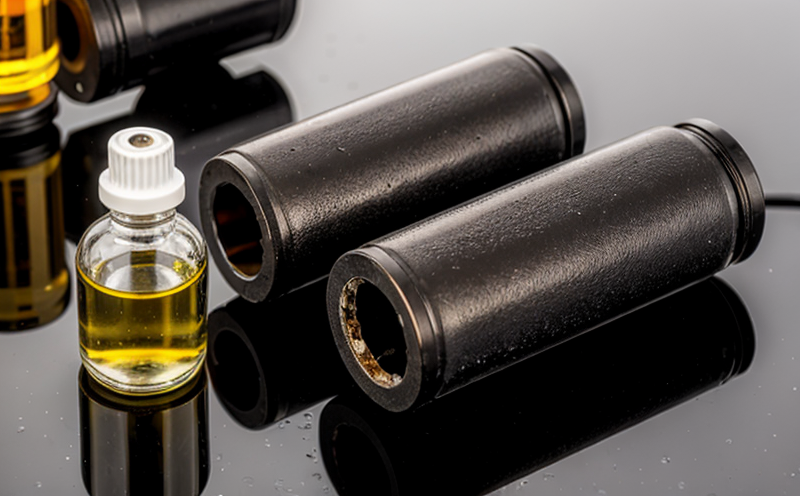ASTM D7678 Kerosene Range Hydrocarbons Test in Water
The ASTM D7678 standard method is a critical tool used to determine the concentration of kerosene range hydrocarbons present in water samples. This test helps identify contamination levels that may indicate fuel leaks, septic system failures, or other environmental issues.
The testing process involves collecting an appropriate sample of water and extracting hydrocarbon compounds within the specified kerosene range (C10-C16). The extracted hydrocarbons are then analyzed using a gas chromatograph equipped with a flame ionization detector. This analytical method ensures high accuracy and precision, making it suitable for both routine monitoring and detailed investigations.
The ASTM D7678 test is essential in sectors such as water treatment facilities, environmental consulting firms, and industrial plants that discharge treated wastewater into natural bodies of water. By adhering to this standard, organizations can ensure compliance with local regulations and maintain the quality of their discharged effluents.
One key aspect of this testing protocol is its emphasis on sample preparation. Properly collected and preserved samples are crucial for obtaining reliable results. This includes avoiding contamination during collection and storing samples at specific temperatures until analysis can be conducted. The test also requires careful handling to prevent any evaporation or alteration of the hydrocarbon compounds, ensuring accurate measurement.
The acceptance criteria for this method stipulate that the concentration limits must not exceed those specified by relevant environmental laws and regulations. Organizations using this service should be aware of these regulatory requirements to ensure their compliance efforts are effective.
In summary, the ASTM D7678 Kerosene Range Hydrocarbons Test in Water is an indispensable tool for identifying and quantifying kerosene range hydrocarbon contamination in water samples. Its application spans various industries, from municipal water treatment to industrial discharge monitoring, making it a vital component of environmental quality management.
Why It Matters
The ASTM D7678 Kerosene Range Hydrocarbons Test in Water is crucial for several reasons. Firstly, it helps monitor and control the release of hydrocarbon contaminants into water bodies, which can have severe environmental impacts if left unchecked. By detecting these contaminants early on, organizations can take corrective actions to prevent further pollution.
Secondly, this test plays a pivotal role in ensuring compliance with local and international regulations governing wastewater discharge and water quality standards. Compliance is not only crucial for legal reasons but also enhances an organization's reputation as a responsible environmental steward.
Furthermore, the results from ASTM D7678 testing can inform decisions regarding remediation efforts if contamination is detected. This information is valuable for both immediate response to spills or leaks and long-term planning for water quality improvement projects.
The importance of this test extends beyond mere compliance; it also supports scientific research aimed at understanding the behavior and effects of hydrocarbons in aquatic environments. Reliable data from such tests contribute significantly to environmental science, helping develop better strategies for managing and protecting our natural resources.
Lastly, the ASTM D7678 Kerosene Range Hydrocarbons Test in Water is instrumental in supporting insurance claims related to water contamination incidents. Accurate test results provide robust evidence needed to substantiate claims and facilitate timely resolution of disputes.
Eurolab Advantages
At Eurolab, we pride ourselves on offering unparalleled expertise in ASTM D7678 Kerosene Range Hydrocarbons testing. Our team of experienced scientists and analysts ensures that every sample is handled with the utmost care and precision.
We utilize state-of-the-art equipment, including advanced gas chromatographs equipped with flame ionization detectors, to provide highly accurate results. Our facility adheres strictly to ISO/IEC 17025 standards, ensuring reliability and consistency in our testing processes.
Our commitment to quality is further reflected in our comprehensive reporting services, which include detailed explanations of the test methods used, observed results, and interpretations thereof. We also offer follow-up support for any additional queries or requests you might have regarding your test findings.
In addition to these technical advantages, Eurolab's team comprises industry leaders who stay current with all relevant standards and best practices. They are dedicated to providing personalized service tailored to each client’s unique needs, whether they require routine testing or specialized investigative services.
Our long-standing reputation for excellence in laboratory testing across various industries speaks volumes about our capabilities. Whether you need regular monitoring of your water quality or one-off assessments following an incident, Eurolab is here to assist you every step of the way.
Why Choose This Test
Selecting the ASTM D7678 Kerosene Range Hydrocarbons Test in Water for your testing needs offers numerous benefits. One primary advantage lies in its ability to provide precise measurements of hydrocarbon contamination levels, enabling you to make informed decisions about necessary actions.
Another significant benefit is the enhanced reputation gained through consistent compliance with stringent environmental standards. By demonstrating commitment to maintaining clean water quality, you can bolster your organization’s standing within both regulatory bodies and community stakeholders.
Moreover, this test supports more effective risk management strategies by identifying potential sources of contamination early on. With accurate data at hand, proactive measures can be implemented before significant damage occurs, reducing overall operational costs associated with remediation efforts.
The ASTM D7678 Kerosene Range Hydrocarbons Test in Water also facilitates better communication between various departments within an organization. When all teams have access to consistent and reliable information about water quality status, it fosters collaboration towards common goals such as sustainability initiatives or operational improvements.
Lastly, choosing this test ensures alignment with international best practices recognized by authoritative bodies like ASTM International. Adhering to these guidelines not only simplifies compliance processes but also positions your organization favorably among peers and competitors in the global market.





